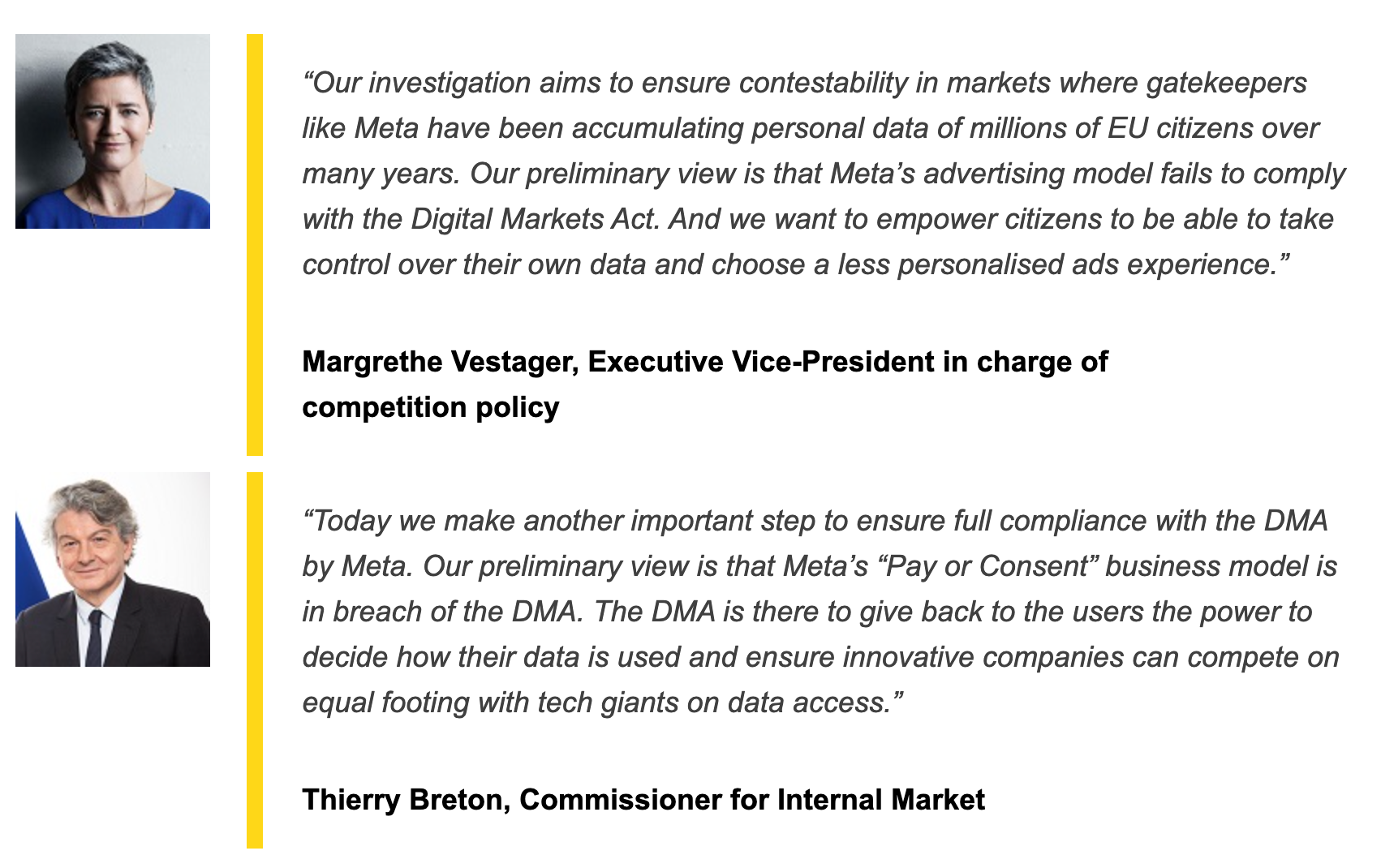Meta, the social media titan that has files on every single human that has ever logged on to one of its social platforms, is finally in the crosshairs of Europe. Failure to comply would mean the well-suited blokes in the European Commission would handsomely take a few billion dollars from Meta’s coffers with a lovely smile.
As expected, it’s Meta’s own shitshow arising out of their devilish hunger to monitor every single second of our online existence. Here’s a brief primer on the how and why. When the landmark Digital Markets Act and GDPR went into effect in the EU bloc, Meta launched a paid version for EUR 9.99 (or EUR 12.99 for mobile) that would offer an ad-free Instagram and Facebook experience.
But there was a bigger underline here. For anyone who didn't pay, Meta would also collect data from their web activity to show personalized ads. That meant users only had a binary choice. Pay a fat fee to get rid of ads and internet activity tracking, or live with a free ad-loving version that would tail your internet shenanigans in the hands of advertisers.

We all know how it ends when that happens. Cough. Cambridge Analytica scandal. Cough!
Well, the EU overlords aren’t too psyched about the pay-or-leave route taken by Meta. The European Commission's crack team of investigators has stumbled upon the revelation that Meta's "pay or consent" scheme for Facebook and Instagram users in Europe might not be playing nice with the bloc's Digital Markets Act (DMA).
In its press release, the Commission astutely observed that Meta's ingenious "take it or leave it" approach "forces users to consent to the combination of their personal data and fails to provide them a less personalised but equivalent version of Meta's social networks." Here are the two core objections:

Should Meta dare to flout this market contestability regulation, which has graciously blessed them and other "gatekeepers" since March 7, they might find themselves in a bit of a pickle. The penalties? A mere trifle of up to 10% of global annual turnover, or 20% for those overachievers who like to repeat offenses.

That could be a record-breaking fine. Meta's revenue for 2023 was $134.90 billion, which means it could end up paying a cool $13.49 billion in fines. Or even double, if the EU thinks the freshly-dripped Zucks is not fixing his ways.
Circling back to the auspicious day of July 1st, 2024. But here's the real kicker — Meta might finally be forced to abandon their beloved business model of "agree to be stalked online or get lost." Oh, the horror!

The EU opened a formal DMA investigation into Meta's "pay or consent" offer in March, after months of incessant nagging from privacy advocacy and consumer protection groups. These troublemakers even had the audacity to suggest that a subscription to avoid ads might not comply with data protection or consumer protection rules. The nerve!
Back in the good old days, the Commission voiced concern that Meta's binary choice might not provide "a real alternative" for users who don't fancy being tracked. Meta's brilliant solution? Either agree to be monitored like a lab rat for targeted ads or cough up a measly few Euros for ad-free bliss. What a bargain!
The EU's noble quest with the DMA is to level the playing field by targeting the various advantages that gatekeepers shamelessly exploit using the dominance afforded to them by hundreds of millions of social media users. In Meta's case, the Commission, in a stroke of genius, realized that the company's dominant position in social networking allows it to extract more data from users to profile them, giving its ad business an unfair advantage.
Who would've guessed? To reset this dynamic, the EC introduced a revolutionary requirement in the DMA that gatekeepers must obtain people's permission before tracking them for ads. Ouchie ouch!

The regulator's case against Meta argues that the ad-tech giant is failing to provide people with a free and fair choice to deny tracking. Users who refuse Meta's tracking apparently have the right to access a less personalized but equivalent alternative.
After a grueling three months of investigations, the Commission's preliminary view is that Meta might be breaching this requirement. A paid subscription isn't a valid equivalent to free access? The regulation also stipulates that gatekeepers cannot make use of a service or certain functionalities conditional on users' consent.
In the DMA context, the bloc's enforcers say a gatekeeper would have to argue why a fee is necessary. The EU mentioned that Meta can technically offer an alternative service with ads that don't rely on personal data for targeting – like contextual advertising.
Meta has never explained why it hasn't offered users a free, contextual ads option. The EU seems to be on a thrilling journey to force Meta into providing a non-binary, privacy-safe choice in the coming months. Edge-of-your-seat stuff, really. Can't wait to see how this rollercoaster ride ends. Maybe with a shower of a healthy few billion Euros from a pissed-off Meta?

